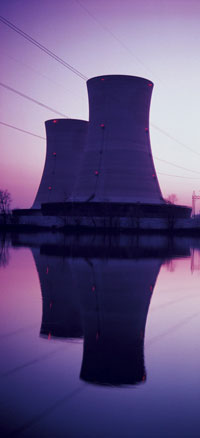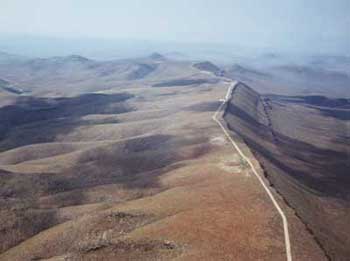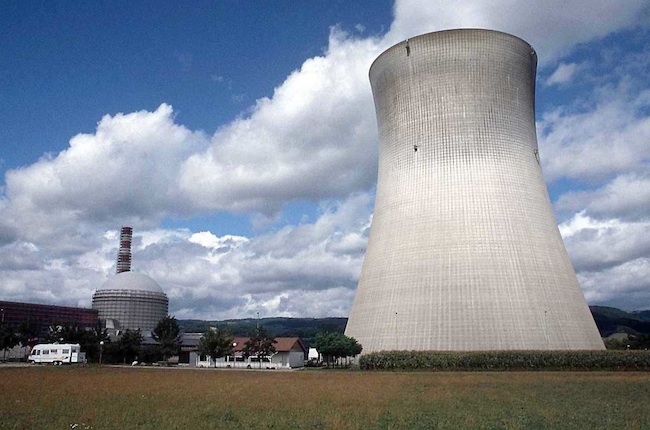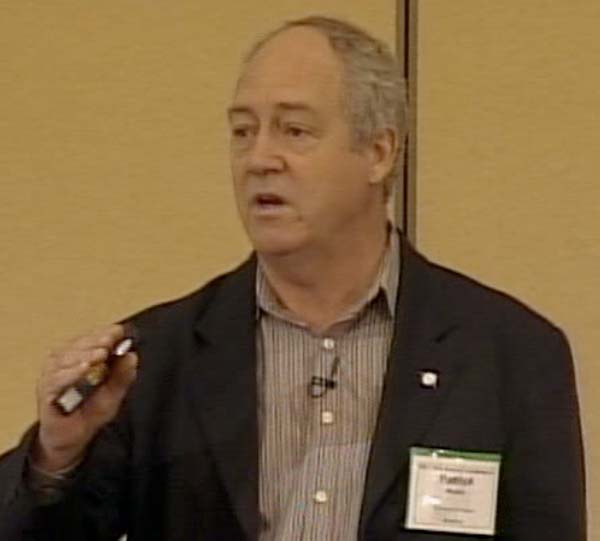Submitted by Diane Farsetta on
Wisconsin law sets two conditions that must be met before new nuclear power plants can be built in the state. One is that there must be "a federally licensed facility" for high-level nuclear waste. In addition, the proposed nuclear plant "must be economically advantageous to ratepayers."
 It's a law that the nuclear power industry doesn't like. Given the near-death of the planned waste storage facility at Yucca Mountain, and the estimated $6 to $12 billion cost (pdf) of building one nuclear reactor -- not to mention the lack of interest from private investors and the tanking economy -- Wisconsin's law effectively bans new nuclear plants in the state, for the foreseeable future.
It's a law that the nuclear power industry doesn't like. Given the near-death of the planned waste storage facility at Yucca Mountain, and the estimated $6 to $12 billion cost (pdf) of building one nuclear reactor -- not to mention the lack of interest from private investors and the tanking economy -- Wisconsin's law effectively bans new nuclear plants in the state, for the foreseeable future.
Earlier this year, the major U.S. industry group Nuclear Energy Institute (NEI) registered four lobbyists in Wisconsin.
NEI is lobbying state legislators on issues related to "nuclear generation ... engineering education and other issues related to state policies on energy, job creation, and environmental law," according to disclosure forms.
It's the first time that NEI has had lobbyists in Wisconsin since at least 1996, though the group has organized public and media events here, especially in recent years. As it does on the national level, NEI argues that building new nuclear power plants would bring good jobs to Wisconsin while helping reduce the state's greenhouse gas emissions, especially from coal-fired power plants. NEI's foray into Wisconsin politics is logical and not at all surprising -- until you compare it to the group's apparent lack of interest in other states with similar laws.
Moratorium nation
Wisconsin passed its moratorium on new nuclear plants in 1983, the same year that the U.S. Supreme Court upheld a similar measure in California. While the federal government decides "how to build and operate nuclear plants," the Supreme Court found that California's restrictions were allowable, as "Congress has not required States to 'go nuclear.'"
California still bans new nuclear plants, until there is "a demonstrated technology or means for the disposal of high-level nuclear waste." The size of the state and its growing energy needs led the trade publication Nuclear News to call California (pdf) "critical, not just for the economic prospects of the nuclear industry but for the environmental impact on and energy supply adequacy for the nation's most populous state."
Yet NEI doesn't have a single lobbyist in California. There are local people and groups who want to repeal the state ban. Assemblyman Chuck DeVore has tried repeatedly, through the legislature and through a ballot initiative campaign, even setting up a group called Power for California. However, NEI's involvement has been minimal. When the Fresno Nuclear Energy Group held its first public event in 2007, NEI's high-profile spokesman, former Greenpeace activist turned industry PR consultant Patrick Moore, was the main attraction.
It's not just California and Wisconsin. More than a dozen states effectively ban new nuclear power plants. Minnesota law simply says the state will not approve "the construction of a new nuclear-powered electric generating plant," though a bill to repeal this language has been introduced. Connecticut has a moratorium similar to California's. Before West Virginia can consider a nuclear plant, there must be a waste facility "proven safe, functional and effective" over two years, and nuclear power must be "economically feasible." In Oregon, voters must approve all nuclear projects, and no nuclear plants can be built until there is a federally-licensed "adequate repository for the disposal of the high-level radioactive waste."
 Kentucky not only requires a high-level nuclear waste facility "in actual operation" by the time the new plant would require it, but also wants to know "the cost of [waste] disposal ... with reasonable certainty." (A bill to remove these restrictions is working its way through Kentucky's legislature.) Maine and Massachusetts also require an operational waste facility. Montana voters must approve building a nuclear power plant, its "radioactive materials" must "be contained ... with no reasonable chance of intentional or unintentional escape or diversion," and its owner must post a bond worth 30 percent "of the total capital cost of the facility," to ensure adequate funds to close the plant. Illinois requires either a federally-approved waste disposal strategy or the state legislature's approval for the project. New Jersey law necessitates a "safe ... proposed method for disposal of radioactive waste material." In Pennsylvania, a nuclear plant can only be built if it provides a cheaper alternative to coal plants, or if the energy needs cannot be met by coal.
Kentucky not only requires a high-level nuclear waste facility "in actual operation" by the time the new plant would require it, but also wants to know "the cost of [waste] disposal ... with reasonable certainty." (A bill to remove these restrictions is working its way through Kentucky's legislature.) Maine and Massachusetts also require an operational waste facility. Montana voters must approve building a nuclear power plant, its "radioactive materials" must "be contained ... with no reasonable chance of intentional or unintentional escape or diversion," and its owner must post a bond worth 30 percent "of the total capital cost of the facility," to ensure adequate funds to close the plant. Illinois requires either a federally-approved waste disposal strategy or the state legislature's approval for the project. New Jersey law necessitates a "safe ... proposed method for disposal of radioactive waste material." In Pennsylvania, a nuclear plant can only be built if it provides a cheaper alternative to coal plants, or if the energy needs cannot be met by coal.
Of all these states, NEI has lobbyists in just three. Michael McGarey, of NEI's Washington DC office, is registered in Kentucky, where he reported lobbying expenditures in March 2008 and February 2009. McGarey's also a registered lobbyist in Pennsylvania, where he was active in early 2007. Then there's Wisconsin, where NEI recently registered four lobbyists: McGarey, two other DC-based employees and a Madison lawyer. That's not bad for a state where, even if the moratorium were repealed, "its [energy] demand growth may still be too modest to encourage new reactor projects," according to Nuclear News.
Madison's pro-nuclear environmentalist
NEI's man in Madison is Frank Jablonski, an attorney who specializes in environmental and consumer issues. He recently testified before two state legislative committees, urging them to repeal Wisconsin's moratorium. "Jablonski is the former general counsel of Wisconsin's Environmental Decade, the group now known as Clean Wisconsin," reported the Milwaukee Journal-Sentinel. At the same hearing, the current "head of energy policy" for Clean Wisconsin, a local environmental non-profit, "cautioned against expanding nuclear power in the state."
Jablonski readily fits the "environmentalist who just happens to support nuclear power, much to the chagrin of their environmentalist colleagues" framing. NEI knows how well this storyline appeals to reporters. It's been wildly successful in presenting NEI consultants Patrick Moore and Christine Todd Whitman as environmentalists who just happen to support nuclear power, and the NEI-funded and Hill & Knowlton-organized Clean and Safe Energy Coalition as "a large grassroots coalition that unites unlikely allies." (To its credit, the Journal-Sentinel described Moore, who also addressed the joint committee hearing, as the head of "an energy coalition funded by the Nuclear Energy Institute.")
Jablonski registered as an NEI lobbyist in February 2009, but previously supported nuclear power. At a March 2008 conference in Madison, Jablonski gave a talk titled, "Changing climate and changing understandings: Paths to new opinions on nuclear energy" (pdf). His profile for the event describes Jablonski as "formerly a member of the Sierra Club" who "recently crossed from the 'anti' to 'pro' side of the nuclear power debate." While still an "anti," Jablonski wrote in a 1995 op/ed column that "Wisconsin's low [electricity] costs were achieved largely because of laws and regulatory actions that the utilities adamantly opposed, such as the nuclear power moratorium."
 "Back in the early 2000s or thereabout, I decided that it was necessary to at least think about whether nuclear should be a possibility, given the circumstances that we're facing and what the scientists have told us about climate [change]," Jablonski told me. After three years of research, "I now favor the use of nuclear energy, its expansion and its further development." His relationship with NEI began at the March 2008 conference where Jablonski gave a pro-nuclear talk. "At that meeting, there were people from the Nuclear Energy Institute, and I hooked up with them," he explained. As an NEI lobbyist, he's met with state legislators and staffers "on both sides of the moratorium issue, to provide my perspective as an environmentalist who changed his position on nuclear."
"Back in the early 2000s or thereabout, I decided that it was necessary to at least think about whether nuclear should be a possibility, given the circumstances that we're facing and what the scientists have told us about climate [change]," Jablonski told me. After three years of research, "I now favor the use of nuclear energy, its expansion and its further development." His relationship with NEI began at the March 2008 conference where Jablonski gave a pro-nuclear talk. "At that meeting, there were people from the Nuclear Energy Institute, and I hooked up with them," he explained. As an NEI lobbyist, he's met with state legislators and staffers "on both sides of the moratorium issue, to provide my perspective as an environmentalist who changed his position on nuclear."
Asked how he discloses that he's an NEI lobbyist, when speaking publicly about nuclear power, Jablonski got defensive. "The NEI stuff is public record," he said, referring to Wisconsin's online registry of lobbying records. Although he describes himself as "an environmentalist who changed his position on nuclear," Jablonski speculated that "the reason that people focus on that environmental angle is because that's what makes it more arresting or interesting." With regards to the recent legislative hearing, Jablonski said, "When I did my testimony, it was invited. ... Did they mention that I was with NEI, in their list of stuff? I didn't even look."
What about his 1995 contention that Wisconsin's moratorium on new nuclear plants helps keep state electricity costs low? Jablonski says that's no longer true, because "the cost overruns that nuclear facilities experienced in the late 1970s and early 1980s, when things went to hell for the business" are a thing of the past. That may be news to Finland, where work on a major nuclear reactor is more than three years behind schedule and billions of dollars over budget, leading to legal disputes.
"We're not lobbyists"
Yet Jablonski's and his colleagues' lobbying is only one facet of NEI's efforts to change Wisconsin's law. Patrick Moore has visited the state at least twice, in the past four months. While in Madison for a November 2008 energy conference, Moore told me that the state's moratorium is "a bit too stringent and restrictive. ... I really do think it needs to be reworded, so that what we have is a requirement that the used nuclear fuel is safely and securely managed into the future." That can be achieved, he argued, by storing waste at nuclear plant sites for up to 300 years or until it can be reprocessed -- or, as Moore called it, "recycled" -- and again used to fuel reactors.
Moore also met with local media, resulting in two anti-moratorium editorials from the Wisconsin State Journal in less than a week. "It should already be clear to lawmakers that the state can no longer afford to rule out the construction of nuclear power plants in Wisconsin," began the first column. The editorial went on to praise Moore, who it simply identified as an "environmental policy consultant."
 Moore must have been pleased. "I don't think it's a problem" when media outlets don't disclose his paid work for NEI, Moore told me. "Really what matters is that my support for nuclear energy is communicated." (Moore also told me he supports developing Alberta's tar sands, a particularly dirty source of oil, but that the extraction should be powered by "small nuclear plants" instead of natural gas, to reduce greenhouse gas emissions.)
Moore must have been pleased. "I don't think it's a problem" when media outlets don't disclose his paid work for NEI, Moore told me. "Really what matters is that my support for nuclear energy is communicated." (Moore also told me he supports developing Alberta's tar sands, a particularly dirty source of oil, but that the extraction should be powered by "small nuclear plants" instead of natural gas, to reduce greenhouse gas emissions.)
In late February, NEI sent another branch of its PR arsenal to Milwaukee and Madison. Clean Energy America is "a group of nuclear energy experts who volunteer their time to raise awareness about the benefits of nuclear energy as a clean, reliable and affordable source of energy," according to its website. The site discloses that Clean Energy America is an NEI program. However, describing its participants as "volunteers" is a bit of a stretch. As Clean Energy America's Darren Gale and John Williams explained to me, they're paid for the time they give to the program by their employers, while travel, lodging and other expenses are covered by their employers or NEI.
Like Moore's and Whitman's Clean and Safe Energy Coalition, Clean Energy America is funded by NEI and coordinated by a public relations firm. In Clean Energy America's case, the firm is Smith & Harroff. The Virginia-based firm has long worked for the nuclear power industry. In the 1980s, it set up a "nuclear industry speakers bureau" for Westinghouse, which later became NEI's "Energy America Program." The PR firm's website describes that program as "'truth squads' of scientists and engineers ... trained by Smith & Harroff to work with the media, then dispatched all over the country." Darren Gale drew a direct line from that earlier effort to Clean Energy America. "They did this twenty-five years ago," he told me. "So this is really the second time that the industry has set up a speakers program like this."
Clean Energy America speakers visited six states in the program's first six months, including Florida, Texas, Georgia and North Carolina. "The timing [of the visits] is usually associated with issues that a state might have, or a region might have," especially in "places that are actively discussing the new plant potentials," according to Gale. "The timing with Wisconsin is really around the moratorium," he said, but "please don't confuse us with lobbyists." Williams added, "When an issue [about nuclear power] pops up in the news, we like to be there to provide answers to questions." During their Wisconsin visit, Williams and Gale went on talk radio shows, met with the Milwaukee Journal-Sentinel and spoke on the UW-Madison campus.
Wisconsin as stepping stone?
Legislative attempts to repeal Wisconsin's moratorium on new nuclear plants in 2003, 2005 and 2007 all failed, but the political ground on the issue has shifted. Last year, Governor Jim Doyle's Task Force on Global Warming came out in support of modifying the law. Their proposed changes would allow new nuclear power plants, if they meet "Wisconsin needs at a cost that is reasonable and advantageous to customers in comparison to alternatives," considering the benefits of reducing greenhouse gas emissions, and the nuclear waste plan is "economic, reasonable, stringent, and in the public interest" (pdf).
A bill to implement the task force's recommendations, including the changes to the moratorium language, is currently being drafted. Since it will be part of a package supporting energy efficiency and renewables, and isn't an outright repeal, it's likely to enjoy wider support than the earlier bills.
There are also new players lobbying to repeal or amend Wisconsin's moratorium. Not only will NEI be actively involved for the first time, but a new industry coalition called "Clean, Responsible Energy for Wisconsin's Economy" recently formed to lobby in support of the task force's recommendations. Its members include Alliant Energy, the Wisconsin Energy Corporation and Xcel Energy. Then there are the usual suspects who lobbied in support of the previous moratorium repeal bills, such as Wisconsin Manufacturers & Commerce, the Wisconsin Industrial Energy Group and labor unions representing electrical and construction workers.
NEI may see Wisconsin as its best chance to finally get rid of a state moratorium. Madison-based NEI lobbyist Frank Jablonski speculated that the industry group may be focusing here because "the politics are more polarized in California," while the Wisconsin legislature has "a number of either open-minded or pro-nuclear Democrats." Moreover, NEI considers Wisconsin a "favorable" state, because it has "legislation in place that helps secure financing." However, its annual Wall Street briefing, delivered on February 12, 2009, did not place any potential new nuclear plants in the state (pdf, page 17).
If Wisconsin amends or repeals its moratorium, it may help the nuclear industry convince other states to relax their restrictions, whether or not new nuclear plants are built here. But first, the people of Wisconsin will have their say, and the debate may be more contentious than NEI anticipates.
Diane Farsetta is the Center for Media and Democracy's senior researcher.
Many of the links in the above article are to articles on SourceWatch, the Center for Media and Democracy's collaborative online encyclopedia (which has special sections on climate change and nuclear issues). You can help update, expand and improve these or any of the other SourceWatch profiles of people, issues and groups shaping the public agenda. It's free to sign up, and we'd love to have you join us.

Comments
Anonymous replied on Permalink
"Stepping stone" You've got to be kidding
Judith Siers-Poisson replied on Permalink
France DOES have a nuclear waste problem
Mutternich replied on Permalink
No big deal.
Anonymous replied on Permalink
Rads in cigs....
Mutternich replied on Permalink
So what are you saying here?
Jonik replied on Permalink
What I'm saying...
Mutternich replied on Permalink
Another easy way to dispose of nuke waste
Anonymous replied on Permalink
Sometimes I wish I was a former "anti"
Mutternich replied on Permalink
Unholy alliance of clean and dirty energy interests?
Anonymous replied on Permalink
Cost overruns are the norm...
Pages